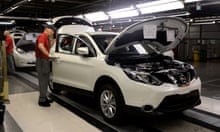Business leaders have blamed the uncertainty created by Britain’s vote to leave the European Union for the slowest pace of output growth in the services sector for almost a year.
Financial data provider Markit said Brexit uncertainty and higher import costs arising from the slump in the pound were behind the stumbling performance of the UK’s largest business sector last month.
In the first half of the year the services sector, which accounts for almost 80% of economic activity, kept the UK from slipping back into recession.
But a decline in real wages growth after a spike in inflation and the reluctance of households to accumulate debt at the pace seen in the first half of 2017 appeared to have hit the demand for services.
Markit said its purchasing managers’ index (PMI) for the sector fell to 53.2 points in August from 53.8 the previous month amid signs that “Brexit-related uncertainty continued to undermine business confidence”. Anything above 50 indicates expansion.
Without a strong rebound over the next few months, analysts said the UK could be heading for another quarter of 0.3% GDP growth and an annual figure that struggles to get above 1%.
The survey followed news of a dramatic fall in car sales during August that analysts warned was connected to household concerns over the outcome of Britain’s talks with the EU.
Private car sales fell by 9.9% in August, compared with the same month last year, to leave the overall annual drop at 6.4%.
The Society of Motor Manufacturers and Traders (SMMT), said August was traditionally a month for low car sales before the September number plate change. The car industry body said the 76,000 sales still represented the third biggest August in 10 years.
Howard Archer, chief economic advisor to the EY Item Club, said car industry sales were declining from all time highs, but nevertheless August’s figures represented the fifth month of falling sales and pointed to “a clear loss of momentum in the sector”.
Last month Mike Hawes, chief executive of the SMMT, warned that motor manufacturers feared the industry’s revival over the past couple of decades could be put at risk by Britain’s departure from the EU.
He said: “A lot of people have spent the best part of decades turning round the industry, when you think back to how it was characterised in the 70s, 80s and into the 90s. It is very different now. It has had very difficult times and it is a cyclical industry, and there is a fear that that success could be put at jeopardy.”
The fall in car sales and weaker services sector growth is “more evidence that the hit to real incomes from sterling’s depreciation and heightened uncertainty about the economic outlook — both attributable to Brexit — are holding the economy back”, said Samual Tombs, chief UK economist at Pantheon Macroeconomics.
Markit said that on a more positive note, the largest majority of services firms since July 2015 reported that work backlogs increased in August. And in response, firms hired the most workers in 19 months and offered slightly higher wages to retain key staff.
But the new orders index declined to 54.2 in August from 54.7 in July, signalling continued weakness in demand.
Chris Sood-Nicholls, head of global services at Lloyds Bank commercial banking, said: “Brexit brings an added layer of complexity and uncertainty, with many investment decisions going on hold. This uncertainty is also impacting sentiment and making it difficult for businesses to plan long term.”
He said the continued weakness of sterling continued to drive price increases and consumers and businesses were feeling the pinch.
“It’s difficult to see anything immediately on the horizon that will nudge the index out of its fairly flat performance,” he said.
Jeremy Cook, chief economist at foreign exchange dealer WorldFirst, said that together with the PMIs for manufacturing and construction, “the services number indicates a quarterly UK GDP rate of 0.3% – and slowing all the time”.
He said: “Brexit uncertainty, higher costs and lower investment are slowing UK output to a chronic crawl. The summer months may have been warm but the recessional risks for the UK economy are only increasing as we move into autumn.”









Comments (…)
Sign in or create your Guardian account to join the discussion